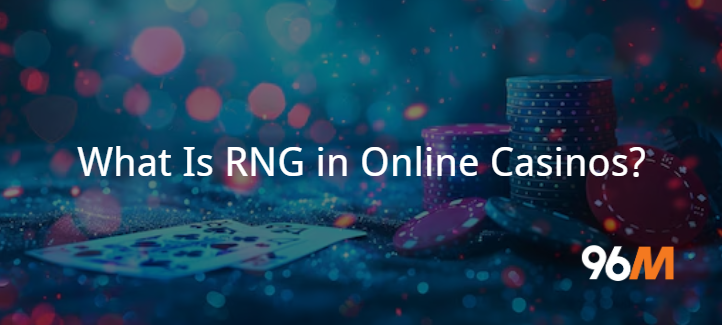
What Is RNG in Online Casinos?
If you’ve ever played slots, card games, or e-sports betting at an online casino, you might have wondered: How are the results decided, and can they really be fair? The answer lies in RNG, or Random Number Generator. At 96M Casino, all games are powered by certified RNG technology to ensure every outcome is truly random and unbiased.
In this extended guide, we’ll go deeper into how RNG works, why it’s vital for online casinos in Malaysia and Singapore, how it’s tested, and what misconceptions players should avoid.
What Is RNG?
A Random Number Generator (RNG) is a mathematical algorithm or hardware device designed to produce unpredictable results. It continuously generates thousands of random sequences every second—even when nobody is playing. When you click “Spin” or “Deal,” the RNG selects the latest sequence to determine the outcome.
This ensures:
- No one can predict the results.
- No external manipulation can occur.
- Every round is independent.
For players in Malaysia and Singapore, RNG technology forms the backbone of fair online gaming, guaranteeing equal chances for every spin, roll, or card dealt.
How RNG Works in Online Casino Games
RNG doesn’t just apply to slots—it powers almost every digital casino game. Here’s how it works across different formats:
- Slots: The RNG generates numbers that correspond to reel positions. For example, if the RNG lands on 132, it may represent a “cherry” symbol on reel 1. The process repeats for every reel, producing the final spin result.
- Roulette: In digital roulette, RNG selects a number between 0–36 (or 0–37 in American roulette).
- Blackjack & Poker: Instead of dealing from a physical deck, RNG determines which card is shown next.
- Dice Games: The RNG simulates the roll, producing a number between 1–6 instantly.
Importantly, each spin or roll is independent. Just because a slot hasn’t paid out recently doesn’t mean a win is “due.”
Why RNG Matters in Online Casinos
For players in Malaysia and Singapore, RNG isn’t just technical—it’s a trust issue.
- Fairness – Prevents patterns or rigging, ensuring every player has equal chances.
- Transparency – Certified RNGs are verified by independent labs, building confidence.
- Legal Compliance – Licensed casinos like 96M must use approved RNGs to maintain their license.
- Entertainment Value – Unpredictability keeps games exciting, whether you’re spinning slots or betting on virtual sports.
Without RNG, online casinos wouldn’t be able to prove their integrity to regulators or players.
RNG Certification and Testing
Independent certification is what separates trusted casinos like 96M from unsafe operators. RNGs are tested for randomness, fairness, and consistency by leading agencies, including:
- iTech Labs – Specializes in statistical randomness tests.
- Gaming Laboratories International (GLI) – Recognized worldwide for gaming compliance.
- eCOGRA – A UK-based body ensuring fairness in online gaming.
These auditors use advanced mathematical models and millions of test simulations to confirm RNG fairness. Only once certified can a game be offered to players legally.
RNG vs Live Casino Games
It’s important to understand the difference:
- RNG Games – Slots, video poker, keno, and electronic versions of table games rely fully on RNG.
- Live Dealer Games – Outcomes are determined by physical cards, wheels, or dice. However, some live games may still use RNG for automated features like card shuffling or bonus rounds.
Both models are fair—but RNG ensures that even without a physical dealer, games remain 100% random.
Common Misconceptions About RNG
Many myths surround RNG in Malaysia and Singapore. Let’s clear a few up:
- “The slot is due for a payout.”
False. RNG makes every spin independent. Past outcomes do not affect future results. - “Casinos can tweak the RNG to make players lose.”
Licensed casinos cannot tamper with RNG. Once certified, the system is locked. Adjustments to payout rates happen at the game design level, not through RNG manipulation. - “If I track results, I can beat RNG.”
Impossible. RNG runs continuously, even when no one is playing, making prediction futile. - “Jackpot timing is fixed.”
Wrong. Progressive jackpots are tied to RNG—any spin can trigger them, regardless of bet history.
RNG and Return-to-Player (RTP)
Players often confuse RNG with RTP (Return-to-Player). Here’s the difference:
- RNG: Decides the random outcome of each round.
- RTP: The percentage of total wagers a game is programmed to return over time (e.g., 96%).
RNG ensures results are random; RTP ensures fairness over the long run. At 96M Casino, both are certified to guarantee trust.
Tips for Players in Malaysia & Singapore
- Choose Licensed Casinos – Always play at certified platforms like 96M for true RNG fairness.
- Understand RTP and Volatility – These affect long-term results, not RNG itself.
- Avoid Chasing Losses – RNG doesn’t “remember” past spins. Treat every round as a fresh start.
- Play for Entertainment First – RNG ensures fairness, but winning is never guaranteed.
Final Thoughts
The Random Number Generator (RNG) is the engine of fairness in online casino gaming. Without it, players couldn’t trust results, regulators wouldn’t issue licenses, and the online casino industry couldn’t thrive.
At 96M Casino, we proudly partner only with developers who use audited and certified RNG systems. This way, every spin, roll, or card dealt is fair and transparent for our players in Malaysia and Singapore.
So next time you play your favorite slot or digital table game, remember: the invisible hand of RNG is working behind the scenes to keep it fair.




